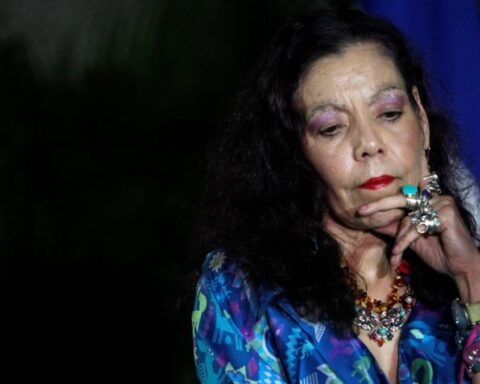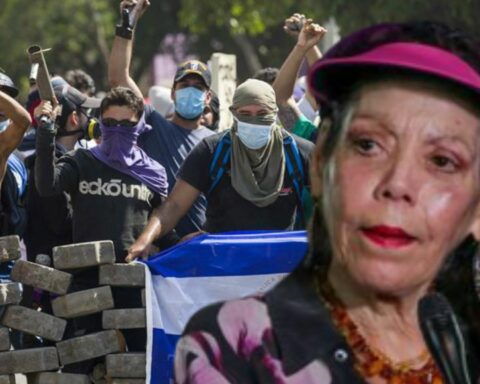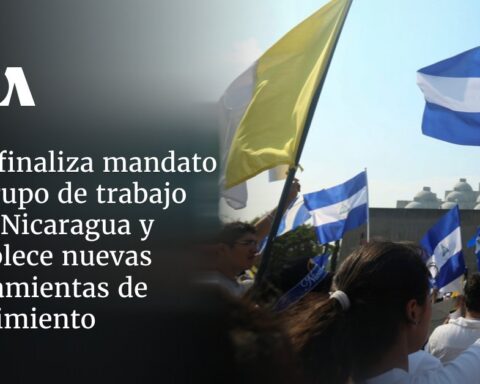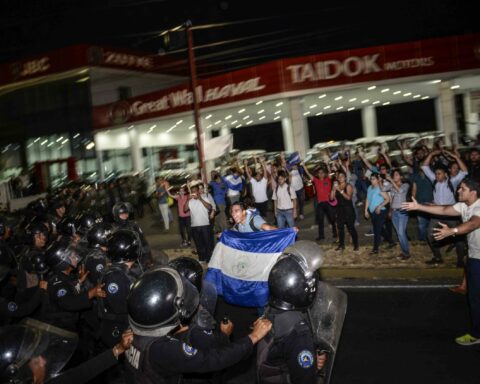The treatment that the Judiciary has granted to the alleged victims in the cases involving the priests Manuel García and Monsignor José Leonardo Urbina, as alleged aggressors, reveal trials with “political interests”, in which the protection of the State has not prevailed towards the victims, turning them into an “instrument” for their own ends, legal specialists concluded.
“It is an unprecedented event to accuse a person who is a victim of violence for retracting their statement,” explained a criminal lawyer who agreed to speak on condition of anonymity. The case corresponds to Martha Candelaria Rivas Hernández, sentenced to five years for the crime of false testimony or perjury. The 44-year-old woman retracted her first version of the events in the Granada courts, in which she pointed out to the priest García – who was found guilty, at the end of June, of the alleged crime of physical violence and psychological violence – of having hit with a padlock on the night of May 30.
At the trial, she assured that everything was an “accident” and that she did not feel attacked.
The criminal lawyer explained that a prosecutor has the power to request an investigation of a witness who changes his statement at trial, but in the cases of victims of gender-based violence it is not appropriate because the retraction is part of the cycle of violence to which he is submitted and cannot be subjected to criminal justice.
In practice, about 70% of cases of gender violence, the trial takes place with the victim withdrawn, using other evidence to support the accusation and until now, no victim had ever been prosecuted, he confirmed.
The step taken by the Prosecutor’s Office by accusing the victim Rivas and the judicial- the judge of the Second Local Criminal Court of Granada, María José Zapata- By condemning it, “it violates all the regulations of Law 779 – Comprehensive Law against violence against women – and the theory of gender,” said the specialist.
In the same way, the criminal lawyer, Yonarqui Martínez, pointed out that this is the first time she has heard of the case of a victim of violence who has been prosecuted and convicted, which means a “huge setback” for the judicial system, and shows a State that does not “He is serving as a collaborator, as a protector, as a handshake with women,” and on the contrary, “he is exposing her,” he said.
“Carmen”, a member of the Network of Women Against Violence, assured under anonymity that the fact of having the “victim and the aggressor in prison” reflects a political retaliation by the State against the Catholic Church, but does not show an interest in the victim, in search of justice, and rather, the person has been denigrated in the media and social networks.
“Here in Nicaragua little is thought of the victims. We have seen in other cases how the victim is exposed, discriminated against, blamed and ashamed. It is a lie that in Nicaragua the system is there to protect the victims, it is the other way around: the aggressors are covered up and the victims are exposed,” said the feminist.
More violations of Law 779
On July 13, the Daniel Ortega regime imprisoned Monsignor Leonardo Urbina, priest of the parish of Perpetuo Socorro, in Boaco, charged with the alleged rape of a 14-year-old girl. Contrary to the first priest, whose judicial process was carried out under complete secrecy, this was widely documented by means related to the regime.
“I worked for more than five years specializing in violence against women and it is the first case in which it has been publicly exposed (referring to the fact that the victim’s grandmother appeared at the first hearing sitting together with a police officer and the witnesses)” , said the judicial expert, Yader Morazán in a recent panel on the Esta Semana program about the irregularities in the case.
In article 43 of Law 779, on the protection of data and the limitations of advertising, it indicates that “the privacy of the victims will be protected; in relation to your personal data, those of your descendants and those of any other person who is under your guardianship. To protect the identity of victims of sexual crimes and other aspects that may expose them to being revictimized, the media must act in accordance with the highest standards of professional journalistic ethics.”
The criminal lawyer points out that the hearing had to have been oral and private because they are talking about a minor under 14 years of age and in this case, “the same State is exposing the girl to publicity,” he warned.
For the feminist “Carmen” in both cases, article 4 of Law 779 is violated, which lists the principles of the regulations, one of them being the comprehensive protection of the victim. When this is not done, she is violating “the law from start to finish,” she stressed. The criminal lawyer emphasizes that Rivas’ arrest has no basis in law. “It’s totally illegal,” he concludes.
A wrong message for victims of violence
With the imprisonment of Rivas, the feminist “Carmen” considers that the Judiciary sends a “dangerous” message to the victims of violence, since, as happened in that case, a complaint could be reversed against her.
For a long time, victims of violence have hesitated to denounce their aggressors because they do not trust the justice system, which leaves them unprotected and “operates in relation to the convenience of government structures and political parties,” says the feminist. There are not only cases of “abusive priests” but of “government people” or “of the party – in relation to the Sandinista Front-” who have been accused of sexual violence, workplace harassment and it is not known what happened to the causes, she denounced .
The only statistics on gender violence are in the hands of the Police, aligned with the Ortega regime, and whose credibility is severely questioned. According to the 2021 yearbook, in 2020 they received 2,282 complaints of crimes against sexual freedom and integrity, while in 2021, it rose to 2,310 complaints. However, women’s organizations allege that fewer and fewer women go to police stations to report their cases because they are revictimized or not attended to, and in many cases, they have ended in femicides.
Last week, a group of entities, including the Ministry of Women, published the booklet “Women, rights, laws and complaint mechanisms to prevent violence”, encouraging women to come forward to file a complaint. However, the effort is not enough without prevention actions and without working on the behavior of the aggressors, explained the criminal lawyer.
For lawyer Martínez, the message that is sent with the treatment given to the two alleged victims of the priests is “negative”, “threatening”, because the victim can be prosecuted, is not heard and is exposed.








